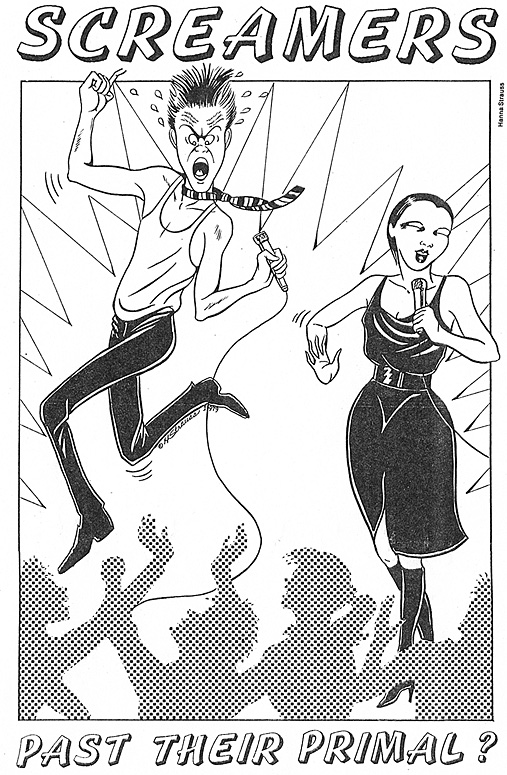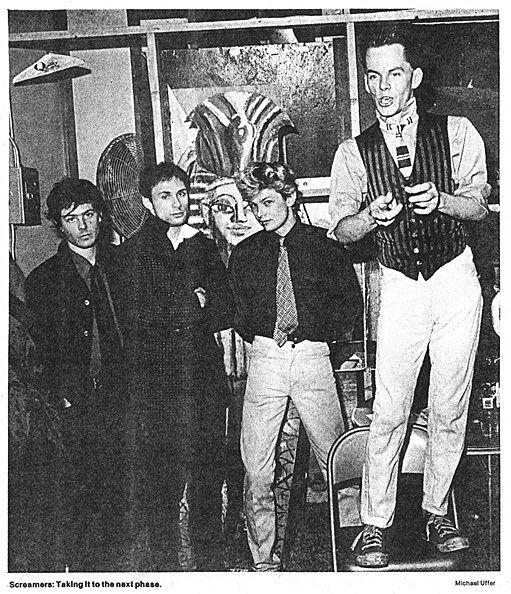
|
| New
York Rocker: You've been on the West Coast since last fall? Tommy Gear: Yes, Hollywood. NYR: And played publicly? TG: We played the Whisky in May. NYR: That's a six-month break. What'd you do all that time? TG: We developed the new show. Wrote a lot of material, new songs, and scripts for two twelve- minute films. When we get back we'll start shooting. We're not going to play again for some time. We're gonna play L.A. again and then we're not going to play for a number of months. We're concentrating on audio-visual productions. NYR: Who's in charge of the visual side of things? TG: A director named Rebe Daalder. He lives in L.A. and did a number of TV shows on German TV and he's considered. . . Well, he's from Holland and there he's considered the top filmmaker. We're working with him on a feature-length film starring Tomata and Penelope from the Avengers. They just broke up, [Tommy and Tomato later add that the film is: "adventure him, youth film, musical, with avalanche and disco scene-no art, and crimes against humanity."] NYR: There are new personnel in the group. TG: Sheila Edwards-she's. . . we wanted to put a show together, and in part of it we wanted to involve the female element and we didn't quite know how. So we started thinking about people we knew who might not ever have performed on stage but who might fit the part. We came upon Sheila, who'd lived in New York and Hollywood and was originally from Las Vegas. We worked and rehearsed the material and it worked out very well. She's quite unique. But basically she's not really in the Screamers: she's making a cameo appearance. NYR: And the strings? TG: We hired them two days before the show. The string section isn't always the same personnel. They make a nice juxtaposition. Almost a cross-reference of Old World and New World. One of them was with the Stuttgart Ballet, and he'd walk around the block from Lincoln center to Hurrah. NYR: How did you like Hurrah? TG: I think it's the best place for a band to play because the audience is so mixed, there's no set scene. It's a good testing ground. Also, there's room for people to escape it if they can't stand us. NYR: You're interested in playing larger venues? TG: It's challenging. In a smaller place you have to make people feel they're part of something bigger. But in a big place you have to make them feel intimacy. NYR: I thought about opera during the show. TG: It is conceived as an operetta. The order of the material is important and the set is done as one piece. We're thinking in theatrical terms more than recording. The two contexts should be considered separately. Not all the songs that work in a live con- text should be recorded, and the other way around. NYR: How much material have you developed by now? TG: Yards. We've been working on film music, too. It's a question of being selective. We're not anxious even though we don't have a record. It's not as though we couldn't have had a record. We've had offers. NYR: Major labels? TG: I don't thank it makes any sense for anyone who takes themselves seriously to take any offer and compromise your sensibility. Sometimes it's better to wait. So many groups are enthralled with having a record but suffer in the long run-momentary madness. NYR: How have you been approached? TG: They don't know how to package us. It's so theatrical, and they're not interested in that, so they question the feasibility of transferring this experience to records. It's caused a lot of reluctance to commit themselves to the whole project and how to promote it. We feel we should steer the whole thing-how it's promoted and presented, and most record companies won't go for it. We don't have the leverage yet to demand full control, but we're getting there. NYR: So in the meantime. . . TG: We're working on two productions conceived to be sold as videotapes, video discs. The record company would be involved in that as much as in record- ing. The whole thing involves a lot of odd politics. But we can deliver on an audlo-visual level and most bands can't, as far as theatricality or production values. We're interested in being more than musicians - a wider context. Music per se is very boring |

| unless It's presented
so you feel an emotional attachent directed at your persona-right at your
brain. it's the same reason we were attracted to the synthesizer. The
variability. Same as the audio-visual interest, rather than just recording.
The potential is so much greater. NYR: Does anyone in the group have theater ex- perience? Tomata: I used to sneak into classes at UCLA all the time. We're interested in crises on stage. Modern- day morality plays. I can do so much more with my face than just the voice. When you've seen and heard me it's a completely different story. NYR: When you played CB's last year, you seemed to be at a much more primitive stage. TG: We've definitely grown. A lot of people in L.A. felt alienated by the show you saw, but we want to go even further. We'll do this show one more time at the Roxy and then start work on our next. You can only do so much in a club context. NYR: Imagine it Kiss were serious. TG: If Kiss were serious, they'd be the Screamers. Instead they're serious businessmen. NYR: You don't use the rhythm machine anymore? TG: We're using pre-recorded tape. It's similar but simpler. NYR: And you dropped ''Eva Braun" from Your repertoire? TG: She dropped us. That was one of the very first songs we wrote. It expressed a sentiment we felt and now we feel it would be a misrepresentation. I guess it's a loss because if you have a record then they're frozen in history. . .and that's fine. Hanging on to old material is like a fetish-necrophilia. NYR: You still draw a teen crowd in L.A.? TG: The majority, yes. But we just can't avoid these art types. I don't know why they don't leave us alone. We definitely have the largest crossover audience of any L.A. band. NYR: But you won't even be releasing a single? TG: We won't do anything just to get something out. NYR: But if you're not going to play out much either. . . TG: We have an extremely loyal audience. We were away six months and came back and played six sell- out shows right away. When we feel the material is really ready, we'll record. NYR: Or go video-disc. TG: I don't know. It would be real exciting to release video before audio recordings. That may be the stan- dard In the future. |